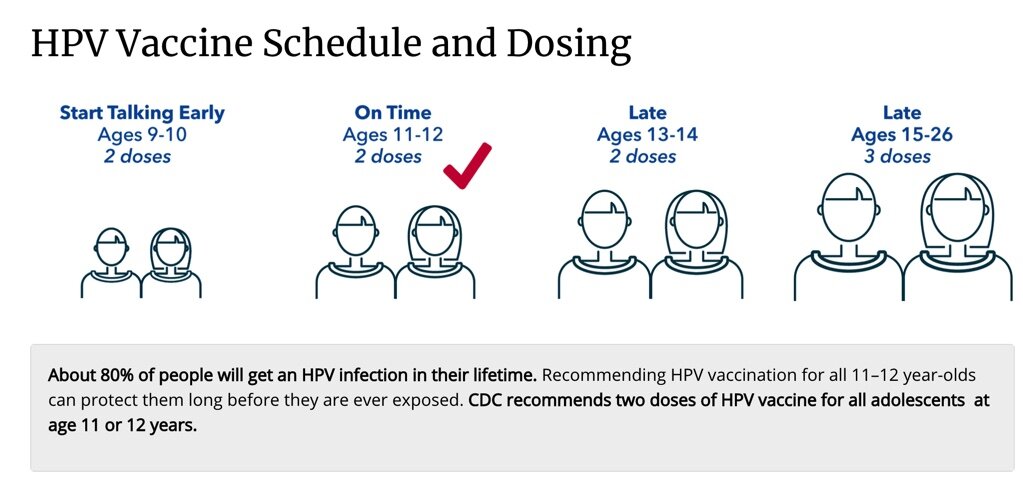HPV Resources
for Clinicians
Protect your patients from HPV related cancer and diseases by educating your patients about HPV and recommending the HPV vaccination during routine visits.
Screening alone won’t protect your patients from all HPV related cancers.
Every year in the United States, 36,500 women and men are estimated to be diagnosed with a cancer caused by HPV infection. Although cervical cancer is the most well-known of the cancers caused by HPV, oropharyngeal cancer is now the most commonly diagnosed HPV cancer and there are four other types of cancer caused by HPV.
Cervical cancer is the only type of HPV cancer with a recommended screening test to detect it at an early stage. The other types of HPV cancers may not be detected until they cause health problems.
HPV vaccination could prevent more than 90% of cancers caused by HPV—estimated to be 36,500 cases every year—from ever developing.
Routinely recommend cancer prevention
HPV is so common that almost everyone will be infected with HPV at some point in their lives. Although most HPV infections are asymptomatic, some persistent infections can lead to cancer in both men and women.
How can you effectively make strong recommendations to parents during a routine exam?
Try the Announcement Approach
Note child’s age.
For 9&10 year olds: Announce children this age are due to start the vaccine series to prevent HPV cancers.
For 11&12 year olds: Announce children this age are due for vaccines that prevent several diseases, placing HPV cancers in the middle of the list.
Say you will vaccinate today.
Example of what to say....
“Because Michael just turned 9, he is due to start the vaccine series to prevent HPV cancers. We’ll give it at the end of today’s visit.”
"Now that Sophia is 11, she is due for three vaccines. Today, she’ll get vaccines against meningitis, HPV cancers, and whooping cough.”
If the parent hesitates...
Connect
Ask the parent for their main concern.
Show you are listening.
Example: “So, what is your concern?” [let them answer]
“I hear what you are saying… you’re worried he’s too young.” or “you’re worried about safety.”
Counsel
Address parent’s concern using a research-tested message.
Recommend getting HPV vaccine today.
Example: “Kids respond more strongly to the vaccine when they are younger. It’s best to give the vaccine before exposure to the virus. I recommend that he get it today and that’s one less shot at his 11 year old visit.
Example: “This vaccine is one of the most studied medications on the market. The HPV vaccine is safe, just like the other vaccines at this age. I recommend that she get it today.”
Messages for counseling hesitant parents:
Age: Kids respond more strongly to HPV vaccine when they are younger. This may give better protection against some cancers.
Sex: This really isn’t about sex. The HPV vaccine is about preventing cancer.
Safety: This vaccine is one of the most studied medications on the market. The HPV vaccine is safe, just like the other vaccines at this age.
Effective: Over 30,000 Americans get cancer from HPV every year. Most could be prevented with the HPV vaccine.
Guidelines: Experts at the CDC agree that kids should get the HPV vaccine starting at age 9, before they are exposed to the virus, in order to prevent several cancers.
Boys: HPV infections don’t care if you’re a boy or a girl. This virus can cause cancer and many other diseases.
Requirements: School requirements don’t always keep up with medical science. The HPV vaccine is an important vaccine that can prevent many cancers.
from the cdc.org
Who Gets 2 Doses?
A 2-dose schedule is recommended for those who get the first dose before their 15th birthday. In a 2-dose series, the second dose should be given 6–12 months after the first dose (0, 6–12 month schedule).
The minimum interval is 5 months between the first and second dose. If the second dose is administered after a shorter interval, a third dose should be administered a minimum of 5 months after the first dose and a minimum of 12 weeks after the second dose.
If the vaccination schedule is interrupted, vaccine doses do not need to be repeated (no maximum interval).
Immunogenicity studies have shown that 2 doses of HPV vaccine given to 9–14 year-olds at least 6 months apart provided as good or better protection than 3 doses given to older adolescents or young adults.
Who Gets 3 Doses?
A 3-dose schedule is recommended for people who get the first dose on or after their 15th birthday, and for people with certain immunocompromising conditions.
In a 3-dose series, the second dose should be given 1–2 months after the first dose, and the third dose should be given 6 months after the first dose (0, 1–2, 6 month schedule).
The minimum intervals are 4 weeks between the first and second dose, 12 weeks between the second and third doses, and 5 months between the first and third doses. If a vaccine dose is administered after a shorter interval, it should be re-administered after another minimum interval has elapsed since the most recent dose.
If the vaccination schedule is interrupted, vaccine doses do not need to be repeated (no maximum interval).
More Resources
information from ACS and CDC to help aid the conversation with parents
..
Action Guides
http://hpvroundtable.org/wp-content/uploads/2018/04/DENTAL-Action-Guide-WEB.pdf
https://hpvroundtable.org/resource-library/#filter=.hpv-roundtable-product
https://youtu.be/5OXcPwf6vsY?si=9lfzOFzxFoQAkOd-
New ACIP Recommendations
https://www.cdc.gov/vaccines/hcp/acip-recs/vacc-specific/hpv.html
https://www.tandfonline.com/doi/full/10.1080/21645515.2022.2146434
HPV Vaccine effectiveness and safety
http://hpvroundtable.org/wp-content/uploads/2019/08/Evidence-Summary-Elimination_Final.pdf
https://www.nejm.org/doi/full/10.1056/NEJMoa1917338
https://www.tandfonline.com/doi/full/10.1080/21645515.2023.2175541#abstract.
Human Vaccines & Immunotherapies
https://www.tandfonline.com/doi/full/10.1080/21645515.2023.2204784
https://www.tandfonline.com/doi/full/10.1080/21645515.2023.2172276
https://www.tandfonline.com/doi/full/10.1080/21645515.2023.2216117
https://www.tandfonline.com/doi/full/10.1080/21645515.2023.2180250
https://www.tandfonline.com/doi/full/10.1080/21645515.2023.2178219
Improving Clinical Systems to Improve Uptake
http://hpvroundtable.org/wp-content/uploads/2019/08/Evidence-Summary-Clinical-System_Final.pdf
How to Recommend Videos
Dr. Margot Savoy Describes How She Recommends HPV Vaccine
Dr. Savoy Discusses How Her Office Routinely Recommends HPV Vaccine
Dr. Savoy Explains How She Addresses Side Effects and HPV Vaccine
HPV Roundtable TV
https://www.youtube.com/channel/UCeX-D142UQHtMiw8ddW77-w
Answering Parents Questions





